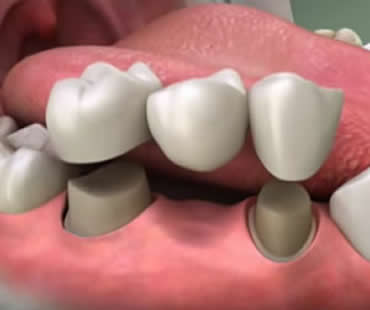
Fun in the summer sun can cause unpleasant side effects such as cold sores and fever blisters. Brought on by herpes simplex virus type 1 (HSV-1), cold sores and fever blisters are transmitted from person to person by saliva or by skin contact. With cold sores, you generally develop clusters of tiny blisters on the lip. Most people are exposed to HSV-1 before age 10. After the first infection, the virus remains inactive until stress, illness, or sun exposure causes a new outbreak.
During the first exposure, you may have headache, nausea, fever, and/or vomiting. Patients may also have painful swelling and open mouth sores. Most of the time, cold sores or fever blisters appear on the edges of your lips. Usually, these outbreaks start with tingling or burning followed by swelling or redness. One or more blisters will typically appear within 24 to 48 hours.
Initial symptoms can last for 7 to 14 days. When the cold sores or blisters reappear, they generally crust over in about four days and then heal within 10 days. You may want to visit your doctor or dentist the first time you develop cold sores or fever blisters, but after that, you shouldn’t need medical attention. Keep the area clean and apply topical medication to lessen symptoms as well as promote healing.
Preventing a first infection for loved ones involves making sure that no one with an active fever blister kisses your kids or other family members. Sunscreen can help protect your lips from cold sores brought on by too much time in the sun.
Dentist in Sicklerville

What is a dental bridge?
- Dental bridges make a bridge between two anchor teeth and are meant to fill a space left by a missing tooth. Teeth can be missing due to trauma, decay or some type of natural loss. Dental crowns cap the anchor teeth, giving the bridge stability and giving the replacement tooth the strength to function as a natural tooth.
What is a dental crown?
- Dental crowns are a restorative treatment meant to protect a tooth that has gone bad due to cracking, acute decay, or has received root canal therapy. A crown is crafted to fit in your mouth and to function exactly as your natural tooth would. They work by covering the damaged tooth entirely and can change the shape or alignment of the prior natural tooth.
Isn’t a dental crown the same thing as a dental cap?
- A dental cap and a dental crown are two different terms for the same thing.
What are dental crowns made of?
- Dental crowns can be made of 100% ceramic (porcelain), porcelain-fused-to-metal, or gold or other metal alloy, including zirconia. Metal alloy dental crowns are typically stronger and more suited for back teeth.
Do dental crowns look natural?
- Crowns made from porcelain or ceramic can be very natural looking. Many materials have excellent translucency, and mimic your natural teeth very well.
Is a dental bridge an option for me?
- Are you missing a tooth? Are your adjacent teeth healthy and stable? If so, dental bridge treatment may be right for you.
Are there options available to me other than dental bridges to replace missing teeth?
- The best alternative option to replace a missing tooth is a dental implant. Dental implants can restore one or more teeth by being placed directly into the jawbone, fusing securely over time.
If you’re considering moving forward to replace your missing tooth or teeth, discuss options with your cosmetic dentist. Get the answers you need to determine if dental crowns or dental bridges can help you reach your smile goals.
We treat patients from Sicklerville and the surrounding area

Many people think all that’s required to maintain good dental health is to floss and brush regularly. Unfortunately certain oral habits can negatively affect teeth, causing substantial damage. Trying to quit or at least curb these habits will help keep your teeth healthy and strong. Habits to avoid include:
Chewing Ice Cubes
Most of us have crunched on an ice cube on a hot summer’s day and thought nothing of it. Teeth are covered in a hard substance called enamel, but continually biting on items such as ice cubes or chewing on pencils and pens can eventually cause tiny fractures in teeth. Over time these fractures will become larger and you might require costly restorative work.
Nail Biting
Nail biting damages your nails and your teeth. You risk chipping or fracturing teeth, especially if they have been bonded or veneered. In addition, every time you put your fingers in your mouth you are transferring bacteria, increasing the risk of illness and infection.
Over Brushing Teeth
Some people think the harder they scrub their teeth the cleaner they will become. In fact you don’t need to brush your teeth particularly hard, and it’s best to choose a soft bristled toothbrush. Ask your family dentist in Sicklerville if you’re not quite sure which brush is best.
Clenching and Grinding Teeth
Clenching and grinding is also known as bruxism and can cause teeth to become worn down, chipped and damaged, or may even lead to them becoming loose. The damage caused by bruxism can extend to your face, head and neck, and sufferers will often have headaches. Your general dentist in Sicklerville can provide you with a custom-made night guard to prevent your teeth from biting together while you sleep.
Overusing Whitening Products
Most of us want to have a healthy white smile, and tooth whitening is one way to achieve this. Unfortunately some people take this too far and will overuse whitening products, causing tooth sensitivity and damaging tooth enamel. It’s best to book a professional tooth whitening treatment for the brightest and safest results.
If you need a dentist in Sicklerville contact us today

Each year, more than 30,000 Americans receive an oral cancer diagnosis. Unfortunately, less than 57 percent will live beyond five years. In fact, the death rate for oral cancer is higher than cervical cancer, Hodgkin’s disease, brain cancer, and liver cancer. Usually seen in older patients, oral cancer in individuals under 40 is on the rise.
Fast Facts about Oral Cancer
• Early detection increases the survival rate to almost 90 percent.
• Initially, oral cancer patients may have few obvious symptoms of the illness.
• Certain factors, such as gender, lifestyle choices, and age can increase your risk of developing oral cancer. An estimated 25 percent of oral cancer patients, however, have no risk factors for the disease.
• Famous people who have battled oral cancer include Michael Douglas, Roger Ebert, Aaron Spelling, Humphrey Bogart, Eddie Van Halen, and Babe Ruth.
• Signs of oral cancer include a sore that does not heal after two weeks, color change in oral tissue, hoarse or scratchy throat, and difficulty with chewing or swallowing.
• Side effects of oral cancer may include chronic discomfort, loss of oral function, and difficulty in chewing, swallowing, or speaking.
• Research suggests that a diet rich in fruits and vegetables decreases your chances of developing cancerous lesions.
• Routine dental visits allow your dentist to look for signs of oral cancer, which can lead to early detection if there is a problem.
• Tobacco and alcohol use can result in a 75 percent chance of receiving an oral cancer diagnosis.
We treat patients from Sicklerville and the surrounding area

There are times when a tooth is so damaged from decay, trauma, or cracking that a filling isn’t the best choice. In these cases, a dental crown may be recommended for long-term tooth health. If a tooth is missing completely, your dentist may suggest a dental bridge to fill the gap between two bordering teeth.
Dental crowns, or “caps,” completely cover and protect your damaged tooth. It is bonded in place, giving you a stable, strong, and attractive alternative for your original tooth. Because it is customized for you using impressions your dentist makes of your teeth, it is a perfect match in size, shape, and position to your natural tooth.
Dental crowns can be the perfect solution to a severely damaged tooth. You won’t need to worry about pain, tooth stability, or your appearance when you choose a dental crown. Depending on what material is used, your crown can look as natural as your own tooth.
Dental bridges are designed to span a gap caused by a missing tooth. Having a gap in your smile can affect you in more ways than just cosmetics. Chewing and talking can become problematic as teeth adjacent to the gap begin to shift, leaving the potential for gum disease or jaw issues.
Dental bridges literally bridge the gap between two teeth. They are cemented onto the pair of teeth that border the empty space vacated by one or more missing teeth. The bordering teeth act as anchors for the bridge, and are trimmed down to hold a dental crown. Between the two crowns is a replacement tooth, customized for you by your dentist. Once the bridge is in place, you will regain the ability to smile freely while the bridge maintains the shape of your face and lips. You will speak more clearly and be able to eat a greater variety of foods. A dental crown also protects your healthy teeth from issues related to bite alignment.
Dental crowns and dental bridges are excellent choices for overall dental health, and can last a lifetime. To prevent damage to your dental work, avoid chewing things like ice or hard candy. It is also important to maintain regular dental checkups.
We offer dental crowns at our Sicklerville dental office

About 20 million Americans have been diagnosed with asthma, a long-term lung disease that causes swelling and narrowing of the airways. The condition has been linked to oral health, with patients having increased risk for cavities, gum problems, and bad breath.
One of the main culprits negatively impacting an asthma patient’s oral health is the medication required to treat the condition. Some medicines, such as corticosteroids, decrease the flow of saliva. This leads to dry mouth, which in turn can increase cavities and bad breath. Dry mouth is worsened by the fact that many asthma patients breathe through their mouth. Inhaled steroids can also increase the risk of thrush, which is caused by an overgrowth of yeast in the mouth.
Here are some tips for keeping your mouth safe while still controlling your asthma:
- Make sure your dentist is aware of your condition, as well as all medications that you are taking.
- Rinse your mouth with water or a fluoride mouthwash after using your inhaler.
- Consider using a spacer device with your inhaler, which will spray the medication directly into your throat and avoid some of the direct risks to your mouth.
- Bring your inhaler with you to dentist appointments, both to show it to your dentist and to have your medication available in case you experience an asthma attack at the office.
- Ask your dentist if more frequent dental visits are recommended in your case.
- Inquire about adding fluoride supplements to your routine, especially in areas where the water is not fluoridated.
- Maintain good brushing and flossing habits.
If you need a dentist in Sicklerville contact us today












